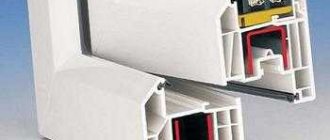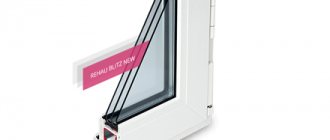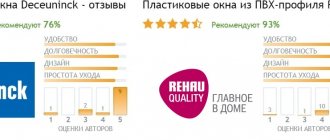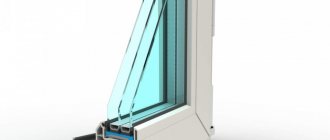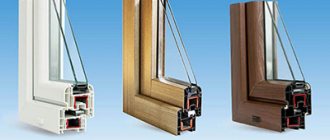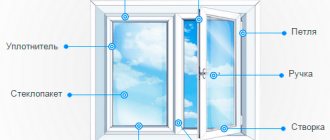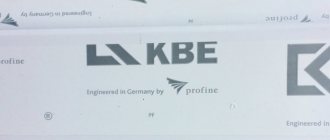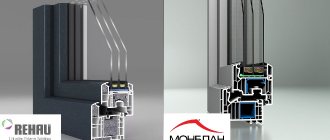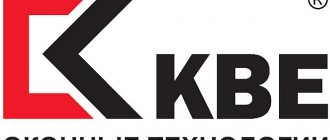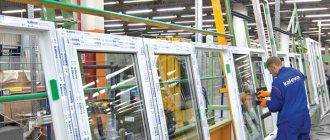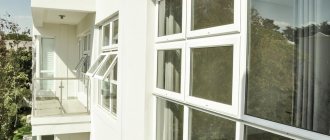The sensitive question of which windows are better - Rehau or Dekeninck - includes a number of parameters: from cost to technical characteristics of profiles, their appearance and performance. It is important to take into account that both REHAU and Deceuninck are brands of PVC profiles, and the finished window, like a constructor, is assembled from many components: double-glazed windows, fittings, sills, etc. Many companies in Russia work with these brands.
Let us note right away that the performance of the window largely depends on the installers. Even the most elite glazing will fail if installed incorrectly, so let’s look at the potential advantages of these two brands.
Technical characteristics of Deceuninck and Rehau profiles
Both lines are classified as class A (except for the Bautek type from Deceuninck, which has class B), both are represented by a whole range of models designed for both modest wallets and wealthy clients. If you take products of the same class, they will not differ much in price, but the set of technical characteristics of the Rehau and Dekeninck profiles will not be the same. You should pay attention to the following indicators (they affect the durability and quality of windows):
- the width of the entire product and its outer wall;
- type of reinforcement, burglary safety;
- the number of thermal insulation chambers inside the window frame - for Russia there should be at least 3 - 5 (and “overdoing it” with chambers can lead to the opposite effect - plastic partitions will begin to act as a cooling radiator);
- thickness of the glass unit;
- configuration and number of seal circuits (both companies use a unique rubber seal);
- roundness of the frame (rounded contours let in 10% more light), the presence of decorative overlays.
According to GOST, the recommended width of the outer wall of the profile for residential premises is 3 mm or more. Deceuninck produces systems with a thickness of 2.5 mm, Rehau - from 2.8 (suitable only for outbuildings; for the house you need to select profiles with an outer wall of 3 mm or more).
The minimum installation width for both brands is 60 mm. More is better. For Deceuninck this figure varies between 71, 76 and 84 mm, for Rehau – 70, 86 mm.
PVC is necessarily reinforced with a steel profile inside the frame, which allows you to make durable plastic structures of any shape and size. Please note that small-chamber wide systems can become deformed over time, because the stiffening ribs are contained in the chambers.
A G-shaped reinforcing profile is preferable. Rehau installs this part in both the sash and the frame. Deceuninck uses it for the premium line, and uses U-shaped reinforcement for the budget series.
The reinforcing galvanized steel insert comes with an open and solid contour. Opened is warmer, one-piece gives additional strength to the structure.
The Brilliant and Delight series from rehau are burglar-resistant; the Delight system has a decorative overlay.
According to the technical parameters considered, the Rehau profile is good, but the Deceuninck is not inferior to it. To more accurately understand which is better, rehau or deceuninck, you need to consider other indicators.
Maximum glass thickness
Most of the window is occupied by double glazing. The wider it is, the better the thermal protection and sound insulation of the window. The Deceuninck company offers the Bautec and Favorit lines with the ability to install double-glazed windows with a maximum thickness of 47 mm. Rehau's widest glass unit with three chambers for the Geneo series is 53 mm. For many countries in Russia, double-glazed windows with two chambers with a thickness of 32-36 mm are suitable.
Products with a thickness above 36 mm are excellent for cities in the northern part of Russia, as well as for places with highly developed infrastructure. Translucent products over 36 mm are installed on windows in northern cities and in places of increased transport or industrial activity.
Sound and thermal insulation of Deceuninck and Rehau profiles
The tightness of a window (and therefore sound and heat insulation) of a window is affected by:
- thickness of the glass unit;
- number of air chambers;
- quality of the seal (sealing rubber not only absorbs noise from the street, but also protects against blowing and guarantees waterproofing).
Since it is air that holds heat in a double-glazed window, the thicker the latter, the more ml of air it can accommodate. For example, a 36 mm glass unit contains 12 ml, and a 40 mm glass unit contains 14 ml of air.
The number of air chambers inside the profile is also of fundamental importance if you live near a busy highway or in a cold climate. Deceuninck and Rehau products are produced with 3, 5 and 6 air tanks between the partitions. The more chambers (but not more than 6), the lower the heat transfer and the higher the sound absorption.
Thus, 3-chamber systems absorb 15-20 dB (each additional chamber adds 8-10 dB to this figure).
The coefficient of heat transfer resistance (CTR) is affected by both the number of chambers and the thickness of the glass unit. Rehau has double-glazed windows with a thickness of 35 mm (with a 3-chamber system) with a CST of 0.62 - 0.64. Deceuninck Forward has a minimum value of 38 mm (3 cameras) and a CST of 0.7. The smaller thickness of the glass unit can be compensated by the number of air spaces inside the frame. Compare REHAU Sib-Design (44 mm, 4 cameras, KST 0.72) and REHAU Brillant-Design (41 mm, 5(6) cameras, KST 0.79).
The maximum CST for the Rehau and Dekeninck systems is the same - 1.05 (REHAU Geneo-Design, has 6 chambers, a double-glazed window with a thickness of 53 mm; Dekeninck Eforte, 56 mm, 6 chambers). In general, the CST of the Deceuninck line is higher than that of Rehau, which is achieved due to the greater thickness of the double-glazed windows and multi-chamber profiles.
But the seal, which guarantees protection from drafts and ice formation in cold weather, is better with Rehau systems (4-circuit with 2 petals). Deceuninck has two-circuit and three-circuit in the premium series.
Waterproofing
To ensure that the window sash fits tightly to the frame, a seal is used, usually made of rubber. The element is responsible for sound protection, moisture resistance and thermal protection.
The Deceuninck company creates profiles with a double-circuit seal for the economy class, and three-circuit for more expensive series. The seal is a chamber with a petal adjacent to it. This type of seal is unique to the series of this brand.
Rehau uses an exclusive seal with four chambers and two petals without a gap between them for its profiles. This allows you to protect the petals from moisture and ice.
The newest seal from Rehau is in many ways better than others in terms of quality of connection to the frame, service life and ability to withstand low temperature conditions.
Compare appearance and average cost
Dekeninck and Rachau window designs are approximately in the same price segment, but the latter brand is still a little cheaper. Thus, a standard window 1470x1420 with a Rehau profile 70 mm thick will cost 9,500 rubles, and Deceuninck (71 mm) - 10,600. These are average prices in the Russian Federation.
When buying a window with a “German” profile, it is advisable to clarify whether it was actually produced abroad or made in Russia using German technology.
Thus, Rehau products have long been produced at a plant near Gzhel. And the Belgian Deceuninck has a branch in the town of Protvino near Moscow (and the production is not certified, unlike Rehau). The inflated price in the latter case will be unjustified.
The appearance of the rehau and deceuninck is memorable. Rehau products have a perfectly smooth structure, without pores. The quality of the seal of this brand is superior to all others, which also affects the design of the window. The colors of Rehau window systems are snow-white, caramel, brown. Painting in various colors or laminated with wood-like film is possible. Deceuninck products are considered elite and they look stylish due to the possibility of installing a wide double-glazed window. If the customer wishes, products can be given any color and texture using lamination.
If you don’t know what to choose, Deceuninck or Rehau windows, then keep in mind that the richer and more diverse line of Deceuninck profiles is ideal for premium-class housing. Rehau products are more affordable, but their Sib-Design system is more durable (service life is approximately 60 years), which allows Rehau windows to be installed in conditions of extremely low temperatures.
Deceuninck or REHAU - which is better?
The appearance of the window system is also of great importance to the buyer. The REHAU profile has a smooth, dense surface that repels dirt and remains snow-white throughout its entire service life.
On request, decoration is carried out using lamination or lamination film of any shade. The line includes a series with a designer frame with rounded lines. The competitor has a more diverse line of profile systems.
Rehau windows have been on the market for a long time and during this time they have received many positive reviews. They have a long service life, can be used in extreme conditions and are well adapted to standard requirements. The collection includes models with prices that are quite affordable for most buyers.
The products of both manufacturers cope well with basic tasks. But when choosing, it is worth considering specific points - climate, requirements for indoor conditions and the planned budget.
Comparison of prices for profile systems
To better understand how the price of windows is formed, let’s consider the main criteria for cost formation:
The price does not differ significantly. Rehau and Deceuninck are almost on the same level, but upon closer examination you will notice that the latter is still more expensive. This can be observed from the table below.
| Profile names | Price per sq.m./rub. |
| Deceuninck | |
| Bautek NEO | 3 549 |
| Favorite | 4 480 |
| Eforte | 5 900 |
| Rehau | |
| Blitz New | 3 456 |
| Delight | 4 057 |
| Brillant | 5 100 |
Average prices are indicated, which may vary depending on the manufacturing company.
Reviews for PVC windows
For the period of 2022, the popular Otzovik website collected 51 (93%) of positive reviews out of 65 left by Rehau users, while for Deceuninck windows - only 9 (76%) out of 13. Of course, the indicators are also influenced by the history of the companies on the Russian market, where Rehau has significant advantages. In addition, good recommendations in favor of the German manufacturer are also justified by the high level of quality and reliability, which guarantees a long service life.
How to choose plastic windows?
I didn’t expect such an ordinary story to gain so many positives. And I’m generally silent about 50 subscribers.
Honestly, when I published the post, I didn’t think that it would become so popular and raise so many questions. Moreover, they are connected not with the history itself, but with the windows.
But since I promised to answer questions, I guess I’ll start.
(Q) What to look for when choosing windows, how to check whether they were delivered, how to understand that they were installed correctly?
(A) No matter how ordinary it sounds, you need to pay attention to the profile, fittings, manufacturer and installer. At the same time, think carefully about what you need from the window.
There are recognized brands of profile manufacturers: KBE, Rehau, Deceuninck, Veka. There are a little less famous, but this does not mean that they are worse. There are disguised ones. Hello Kaleva! – at the ends of the sashes Rehau is clearly readable (Rehau/Rehav/Ryakha/Riho is probably the only window brand whose name is distorted so often).
A huge number disguise themselves as KBE and Rehau. Many people do not hesitate to say that we are analogues of KBE, for example. Well, by the way, KBE window GOST was created in the country, and we are just like them. Not better, but not worse either! I bet you!
And, by the way, sometimes they can keep the tooth to themselves without giving it to anyone, but this is rare. There will still be deviations from the plastic recipe, but you won’t notice them for the first 10 years. Installers may notice that the profile is more fragile, the beads do not bend so well, the seals from the beads come off, etc. It doesn't seem scary, but it can be very unpleasant.
But if you don’t want to make a mistake and are willing to pay for quality and brand, choose from these, which are recognized. At least I haven't encountered any fakes. You won’t save money, but given the existing competition, you won’t overpay.
They all have their own advantages, most often marketing ones, such as the absence of lead in KBE, the coolest anti-burglary bead in Deceuninck, and Veka and Rehau are simply the coolest in life.
Typically, these profile systems are very similar in their characteristics. You need to understand that each manufacturer produces several specialized systems for different user wallets. Moreover, these profiles differ both in their properties and in price. And the difference between economy and “elite” will be significant. But a comparison among manufacturers using similar profile systems will not give a significant difference.
That is, comparing KBE and Rehau profiles with each other is simply pointless; you need to understand which KB profile is being compared with which Rehau. Economy from KBE will naturally be worse than “elite” from Rehau. The same goes for other profiles.
Manufacturers and names of systems change constantly. I don’t know why, maybe to completely confuse everyone?
From memory: Deceuninck – Favorite, Forward, Bautek, Eforte.
I don’t remember Rehau and Veka, I didn’t work with them much, but the principle is the same.
Within these profile systems there is also a division into classes.
But you need to remember one thing. Within these systems, classes and subclasses, the profiles are almost the same.
The number of chambers, the thickness of the profile walls, the material from which they are made - this is all, of course, important, but!
The profiles are almost identical in terms of heat, noise and insulation (I repeat, within their class), all are certified to sanitary standards, and can be used in children's institutions, medical institutions, etc. You could brew doshiki in them if it were convenient.
It is very difficult to somehow organize and catalog profiles from different manufacturers. Everyone is trying to somehow distinguish themselves from the other. I really don’t know how to make a normal sample based on some parameters. The range of parameters is too large.
As a result, I will not go straight deep into the jungle and drag you there. Let's take a very superficial look:
— profiles with an installation width of 58-60 mm, 3 internal air chambers. Classic. These are the windows that are considered the default in almost any window company. We won’t go into numbers just yet, but this is quite enough to survive the winter in the center of Russia. You won't freeze, but don't expect anything outstanding either. This is an analogue of old windows, but it doesn’t see through from everywhere. Most PVC windows in your city are like this.
— profiles 70 mm wide. This is where you need to be careful. Some manufacturers have cheaper profiles with only 4 chambers, some have a black seal instead of a gray one. You need to understand that for customers who want to get a cheaper, but kind of cool product, there are profiles that combine something between a cheap 58-60 mm profile and a more expensive 70 mm profile. Slightly better than the cheap option, but not up to par.
Regular 70 mm, 5 cameras. Good quality windows. Even the doors. Warm, quiet, cozy, reliable. Not a classic, because it's more expensive. But you will like it. Are you ready to pay for them? Take it! Unless you need it even better
